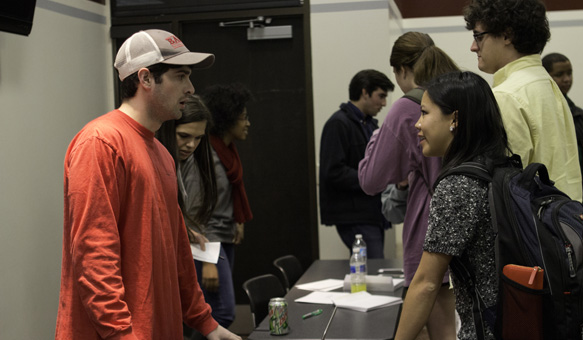Deontay Wilder recognized by SGA
The SGA Senate met Thursday evening to discuss a resolution honoring Tuscaloosa native and WBC Heavyweight Champion Deontay Wilder.
The resolution recognized Wilder for his performance in boxing and representation of Tuscaloosa on a national scale.
“We felt like the University should reach out to him and say thank you for representing us in a proper and professional way,” said Branden Greenberg, speaker of the Senate.
Wilder will have his recognition sent to him by the University.
No other topics were discussed during the Senate meeting. Senators split up into committees after they adjourned to discuss resolutions for next week. The Senate will meet again next Thursday at 6 p.m. in the Ferguson Forum.
Compiled by Nick Privitera
^
UA astrophysics professor lectures on research
UA associate professor of particle astrophysics Dawn Williams held a public talk in Gallalee Hall on Thursday concerning her latest experiment at the IceCube Neutrino Observatory located in the South Pole.
“IceCube is an array of 5,000 sensors spread throughout one cubic kilometer of ice located within walking distance from the geographic South Pole,” she said. “Every time we use a new telescope, we discover something we’ve never seen before.”
Williams said the IceCube experiment has been a great success since its completion in 2010.
IceCube is the second telescope of its kind – its predecessor, AMANDA, was instituted in the mid- to late ’90s. IceCube detects neutrinos, small particles coming from within and outside of our solar system, in order to further understand the celestial bodies surrounding Earth.
“The talk was very interesting,” said Mitchell Grushen, a sophomore majoring in finance. “I watched a documentary on Netflix about something like this and thought it was pretty cool.”
The talk was followed with a public observance in the observatory at Gallalee Hall.
Complied by Danielle Waddell
^
Student group proposes voting reform
United Alabama Project, a student organization on campus, recently created a proposal for voting reform at The University of Alabama. The proposal, now completed, is called “A Step in the Democratic Direction: The Partisan Reform Initiative.”
The group designed the initiative in an attempt to address students’ voting grievances, according to an emailed statement from the organization.
The Partisan Reform Initiative, according to the written proposal, is designed to accomplish four goals. The first goal of the group is to legitimize the Machine “via its incorporation as a public, validated entity which is capable of carrying out all of the proper political functions it already employs” and organizing “non-Machine groups into galvanized, unified factions capable of taking meaningful roles in campus politics.”
The second goal is to increase the accountability of campus politics by allowing for greater transparency.
Third, United Alabama Project seeks to encourage more potential candidates and greater voter turnout, and finally the group strives to increase diversity in the SGA “by giving traditionally under-represented campus demographic blocks the opportunity and resources necessary for political organization.”
The proposal is 36 pages long. Its creation was guided by the executive board, composed of Madelyn Schorr, director of community engagement; Chisolm Allenlundy, executive director; and Andrew Parks, director of political advocacy.
The proposal was created by the executive board in collaboration with Tim Hebson, dean of students; Kelli Knox-Hall, advisor of SGA elections board; J. Norman Baldwin, chairman of the Task Force for Excellence in Equity; Robert Jittrikawiphol, coordinator for student government at The University of California, Berkeley; Kelsey Keny, student body president at The University of Tennessee; Steven Hood, interim vice president of student affairs; Stephen Katsinas, director of the educational policy center; Mary Jolley, director of economic and community affairs; James Tyger, assistant director of student government advising; and Kelly Horwitz, community advocate and member of the Tuscaloosa Accountability Project.
Compiled by Rachel Brown









